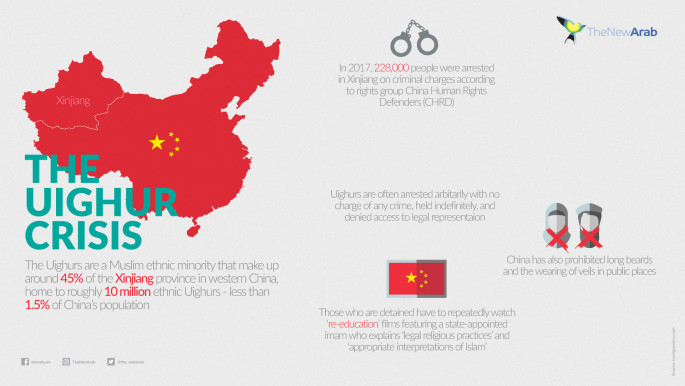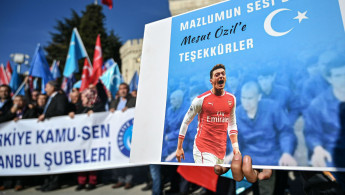Chinese fans burn Arsenal t-shirts following Ozil's prayer for Uighur Muslims
Infuriated by Ozil's tweet, fans in China took to social media, posting footage of them burning Arsenal t-shirts and condemning him for "hurting their feelings."
“Do you know how Arsenal fans in China have spent the last two days?” one fan posted on Instagram.
“They are struggling to understand how the club and idol they once loved has turned out to be a gossip. Of course, if you intend to attack China, you are as insignificant in our hearts as dirty ants.”
Another fan asked him to stay out of politics.
"As a Chinese football fan, I’m very disappointed. Why can’t you just focus on playing football? As a public figure, you should know what you can say, what you can do and be aware of the consequences.”
Last week, German-Turkish football player shared a prayer for the Uighur Muslim minority in China on Thursday, expressing his outrage at the lack of action from Muslim countries.
"Oh East Turkestan," he said, using the name Uighur activists use for the independent state they want to see established in Xinjiang.
"Don't they know that years later what our brothers and sisters will remember of these bitter days is not the torture of the oppressors but the silence of their Muslim brothers?" the football star asked.
"Oh Lord, please help our brothers and sisters in East Turkestan."
He then slammed the Muslim community for its silence."The Muslim community is mute," the Arsenal midfielder wrote in the tweet, which shared a sincere prayer written in Turkish over the blue Uighur flag.
In retaliation, China's state broadcaster CCTV removed Sunday's Arsenal-Manchester City game.
The Chinese Football Association chimed in on Ozil's comments, saying they were "unacceptable" and had "hurt the feelings" of Chinese fans.
Prior to the match, Arsenal FC distanced itself from Ozil's comments, saying they are "apolitical."
Chinese concentration camps
Turkey was one of the region's few voices willing to risk its economic relationship with China by expressing support for the Uighur cause.
But recently President Recep Tayyip Erdogan has struck a softer tone, saying a solution could be found to help thousands of Uighur Muslims interned in Chinese camps "taking into account the sensitivities" of both sides.
China initially denied the existence of these camps, but now claims that its detention centres are not concentration camps but "re-education camps" where "students" are trained to successfully reintegrate into Chinese society. It claims the camps are a necessary measure to counter Islamic extremism.
Read more: Uighur Muslims using TikTok to expose plight of relatives detained by China
Human rights groups say that Uighurs and other Muslim minorities endure political indoctrination at these camps.
Earlier this year, detained Uighur women in China's western province of Xinjiang said they were released by proving their "adaptability to Chinese society" by drinking alcohol and eating pork.
Radio Free Asia revealed in November that Chinese men often sleep in the same beds as the Uighur women, whose husbands are detained in prison camps, during week-long monitoring sessions.





 Follow the Middle East's top stories in English at The New Arab on Google News
Follow the Middle East's top stories in English at The New Arab on Google News

![22 Arab countries at COP29 have rejected the targeting of fossil fuels [Getty]](/sites/default/files/styles/image_330x185/public/2024-11/GettyImages-2184289638.jpg?h=199d8c1f&itok=ptHl5bec)
![Dozens of people turned out for the funerals [Getty]](/sites/default/files/styles/image_330x185/public/2024-11/GettyImages-2185229760.jpg?h=e7c891e8&itok=1bctDcE6)